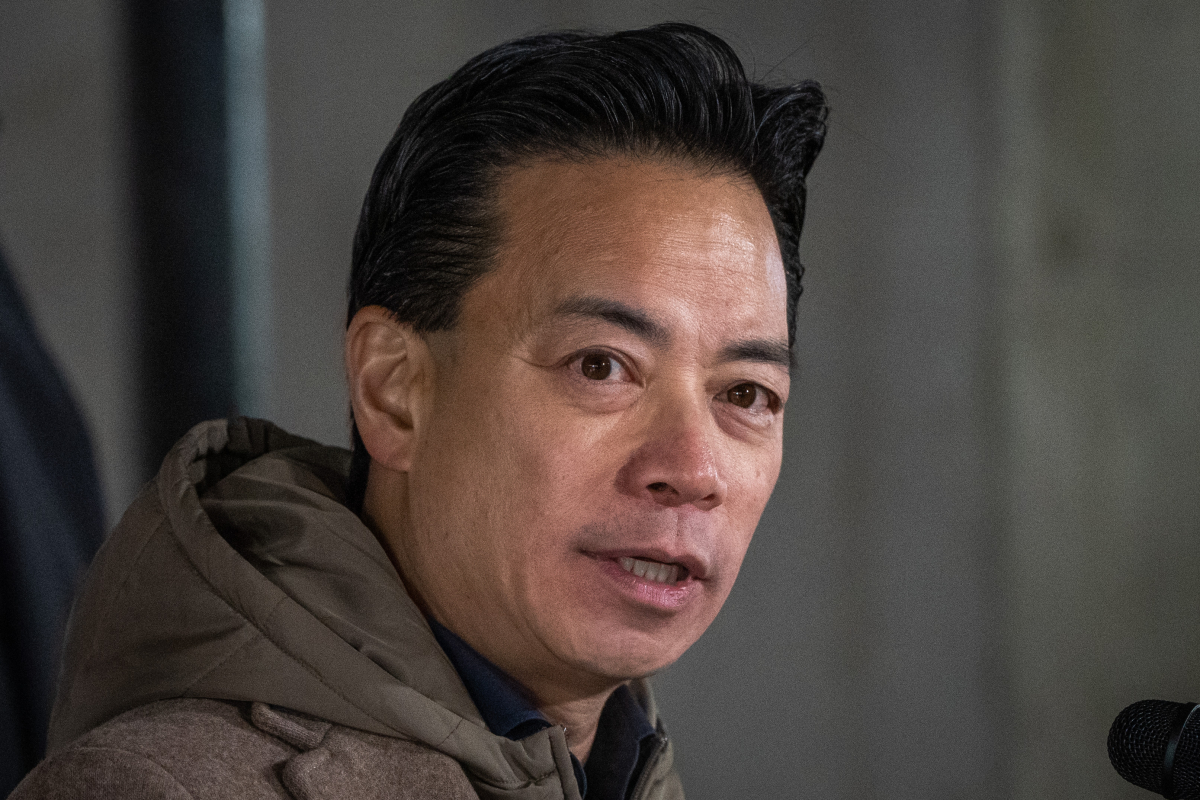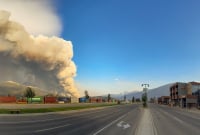Thank you for helping us meet our fundraising goal!
Part 1 of a two-part series.
There is a universe in which the so-called “natural” gas industry reinvents itself, gracefully transitioning to alternative forms of genuinely renewable energy, aiding in our shared need to rapidly reduce emissions and supporting worker transition for the future.
Sadly, that does not appear to be the universe in which we live.
Instead, Canada’s main residential suppliers of fossil gas remain unrelenting in their bloody-nailed determination to expand our reliance on their planet-burning, climate chaos-inducing product.
In British Columbia, where I reside, the residential gas supplier is FortisBC, a private monopoly that simply refuses to take no for an answer. Across the province, over two dozen municipalities (including some of our largest) have passed policies that prohibit the use of gas heating in new buildings. The B.C. government’s target date for a similar province-wide policy isn’t until 2030, but it has encouraged municipal governments to move sooner.
FortisBC, however, is pushing back – sometimes directly and sometimes by proxy. Let’s dig in.
Vancouver rolls over to gas lobby
Over the past few years, in hundreds of talks across the country, I have told the story of the City of Vancouver’s decision to prohibit new buildings from using fossil fuels for heating. In a bylaw dating from 2020 (and in effect since January 2022), this bold policy stood out as an early beacon of genuine climate emergency action, given that gas burned in buildings currently accounts for 55 percent of Vancouver’s greenhouse gas emissions. (And full disclosure, the Vancouver city councillor who championed this move, Christine Boyle, is my wife.) Vancouver led the country in getting new buildings off of gas, with a clear plan that created certainty for builders without adding costs for residents, and dozens of other municipalities were inspired to follow suit.
The gas industry, however, has been plotting a reversal ever since. And last week, it successfully got the Vancouver policy overturned. Poorly timed, the about-face came the same week the world recorded its hottest days ever and a third of Jasper burned to the ground.
Normally, changes in policy such as this would come in the form of a motion, tabled with at least a week’s notice, giving members of the public a chance to voice their opinion, speak before council, and marshal expert feedback, ensuring such a big decision be made based on credible information and transparent dialogue. Not this time. Instead, ABC Councillor Brian Montague (who had recently met with a FortisBC lobbyist), in a particularly cowardly manner, tabled a surprise late-in-the-day amendment to a staff report (ironically, a progress report on the city’s climate plan, which highlighted that the city was behind in hitting its GHG reduction targets). The amendment reverses the city’s prohibition on gas in new buildings and gives staff until November 1 to come back with new bylaw language that would pave the way for the return of this fossil fuel.
(Incidentally, Councillor Montague, who actually lives outside Vancouver, has not been particularly active on council. This past week also saw him introduce his first-ever motion – paradoxically a move to “review” and possibly abolish the city’s Integrity Commissioner.)
With no one except his fellow ABC councillors (the right-wing majority) knowing this abrupt move was coming, the public wasn’t able to weigh in, nor did staff or outside experts have an opportunity to offer evidence or insights. The vote was nevertheless very close: 6-5. The three opposition councillors voted against the policy reversal (Green Councillors Adriane Carr and Pete Fry, and OneCity Councillor Boyle) and, to their credit, two ABC councillors, Lisa Dominato and Peter Meiszner, broke ranks with their party to vote no. This forced Mayor Ken Sim to Zoom in from holiday in Europe to cast the tie-breaking vote in favour.
Tellingly, the mayor’s office already had a news release ready to go that evening, with third-party validation lined up from the Homebuilders Association Vancouver and the Greater Vancouver Board of Trade. FortisBC itself has done its best to stay quiet, although it has a rep on the board of the Homebuilders Association. On July 26, in a call to FortisBC, I asked a media relations officer for information on the corporation’s lobbying efforts with city councillors and whether Fortis provides funding for industry front groups such as Voice of Energy and the BC Coalition for Affordable and Dependable Energy, but I await a reply.
The core arguments made by Councillor Montague and in the mayor’s press release mirror FortisBC talking points: allowing gas will make homes “more affordable”, speed up construction, restore “choice”, and improve “reliability.” With no hint of irony, Councillor Montague claimed that, “As climate change leads to more severe weather events, having multiple energy options is crucial.” The mayor hailed the amendment as, “a pivotal moment in Vancouver's journey towards a sustainable future.”
Every one of these arguments could have been easily debunked, if the ABC council had the courage to allow experts to respond. In a CBC interview in the wake of Vancouver’s vote, Mark Jaccard, chair and CEO of the BC Utilities Commission, disputed the claim that electric power was unreliable. As CNO’s Marc Fawcett-Atkinson has written, “Several analyses – including from B.C. Hydro, B.C. Housing and Clean Energy Canada – say installing electric heating systems like heat pumps in new buildings typically costs the same amount as using gas, or less.” The Pembina Institute noted in its response to last week’s news, “According to case studies from the Zero Emissions Innovation Centre (ZEIC), zero-emissions buildings can achieve cost parity with gas-fired buildings. Forgoing gas infrastructure [also] simplifies design and construction, which can reduce costs.”
My own revelatory moment on this question came about a year ago, when I asked a senior person with one of Vancouver’s big real estate development companies if building all-electric is more expensive. He laughed and replied, "We live in a capitalist market economy. The cost of a new home is whatever a developer can get in this market. Marginal input costs like this are irrelevant."
During last week’s council meeting, city staff also took issue with the up-front cost claims made by the mayor, and additionally noted that new home buyers would face increased retrofit costs down the road. They cautioned this policy flip-flop risked causing upheaval and confusion in the industry. Most importantly, they warned the move would take the city backward on meeting its climate goals. But the majority of councillors seemed uninterested. “Look,” Mayor Sim said, “we all love the environment… But we need balance.”
The amendment language highlights the purported “rapid decarbonization of BC’s gas system such as provincially-stated RNG percentage targets (15% by 2030),” even though FortisBC itself has recently noted that, currently, only one percent of its supply constitutes renewable natural gas. At this rate, I’d say the plan isn’t going well.
Ignored by the city’s reversal is the growing issue of safety as the world heats up. Electric heat pumps also provide cooling in the face of extreme heat events and help filter out smoky air when wildfires are rampant, something natural gas heating does not.
But none of that matters – this was Mayor Sim and a majority of his councillors merely doing the gas industry’s bidding.
What happened last week in Vancouver is also a warning of what will happen province-wide or nation-wide if ABC’s Conservative allies are elected in sufficient numbers to form government –– every meaningful climate policy won in recent years will be subject to reversal. It should go without saying that we can’t afford to have that happen.
In the meantime, if Vancouver’s latest move has you fuming, it’s not too late to press for a reconsideration. Stand.earth has a tool for you to email the mayor and council and share your disappointment here.
The concerted push-back from the gas lobby, however, goes well beyond Vancouver. More on that tomorrow in part two.






Comments
"Canada’s main residential suppliers of fossil gas remain unrelenting in their bloody-nailed determination to expand our reliance on their planet-burning, climate chaos-inducing product."
C'mon Seth, tell us how you really feel!
lol!
(Brilliant summary, btw. :-)
The implicit criticism in "why don't you tell us how you REALLY feel" is essentially a male and conservative attitude characterized by being "low-drama" if you speak at all; taciturnity is favoured. To reflect genuine emotion remains a taboo among such men because it's considered effeminate, although it can have its uses politically as Smith just demonstrated on the topic of Jasper's fire.
This is how climate change can so easily CONTINUE to be marginalized, by labelling it "alarmist," rational though that response is. Like Ken Sim says, "we all love the environment/Mother Nature/women, but we need BALANCE," so settle DOWN, calm DOWN, take a pill, chill, get a grip, etc. if you want to be taken seriously as a real man and/or a contender or "playa" in this capitalist system we all live in.
Conservatives are literally betting everything on male hegemony remaining the status quo and/or the natural "balance" in this "vast, unmothered world," as Adrienne Rich wrote, but Mother Nature, from whence we all came, begs to differ.
Thanks for reminding me that climate change deniers and petro-captured politicians don’t all reside here in Alberta.
Burning one gigajoule of gas produces 49.8 Kg of co2…irregardless of whether it is fossil gas or “renewable” biogas. It clearly has no significant role to play in stabilizing our climate system. If you are heating your home or hot water with methane gas, you are contributing to the heating of our planet.
"FortisBC has applied to the BC Energy Regulator to discharge wastewater at both ends of its proposed 14-foot wide, 9-kilometre tunnel under the Squamish estuary: at the BC Rail site and at the Woodfibre site.
Woodfibre LNG has also applied to discharge 1,600 cubic metres of effluent per day at the Woodfibre site for over four years.
These three permits together could result in cumulative, long-term toxic effects for wildlife and ecosystems in Átl’ḵa7tsem / Howe Sound. There is also a risk of significant human health impacts from exposure to heavy metals and persistent organic pollutants (dioxins and furans)."
"Frackers pay $2.25 per 1,000,000 litres of water. If they paid Victoria water rates, they’d be paying $1,176.00 per 1,000,000 litres. What’s worse, fracked water is toxic, so it can’t be reused the way household water can." ... BC Green Party
"Leaked recordings of fossil fuel executives at the Calgary-based pipeline giant, TC Energy, expose how staff influence politicians, the media, and public opinion: from writing briefing notes for Ministers and Premiers, to undermining the voices of opposition groups, to influencing Premier David Eby's position on LNG during a trade mission to Asia." My Sea To Sky.
Time to shut down this corrupted polluting industry for good. Propaganda and outright lies form this disgusting dirty energy exploiter are so huge they outweigh their methane immersions. An industry of sus, tramping over the rights of the people by bribing (lobbying they like to call it as it sounds legit) elected officials.
I get it, you know. It's hardly a surprise that they're doing this. We should remember why, and remember that it applies to corporations in general in smaller ways. Bottom line, in order for the planet not to fry, FortisBC has to go out of business. And if FortisBC goes out of business, it will not be making a profit. Shareholders will lose a lot of money. And our economy is set up to motivate people with money to do ANYTHING rather than lose some of it, and to give them a lot of power to do that anything. So they lobby and they lie and they cheat to try to stave off the inevitable. And they tell us that them continuing to make profits is natural and necessary and good for us, even though we know it actually helps kill the planet, give us respiratory illnesses, and the fracking poisons masses of groundwater.
But, that's capitalism. One of the most important ways of making money is ALWAYS through "externalities"--making everyone else pay for costs corporate activity created. And they ALWAYS lie and tell us that there's nothing to see here, and everything they do is natural and "efficient", that the very act of seeking profit cleanses anything they do of sin, and so nobody should ever seek to constrain them, control them, regulate them in any way. In the case of fossil fuel companies it has been rubbed in our noses till they bleed, that it's complete and utter BS. But we should remember that it's BS the rest of the time, too; there is plenty of damage being done that's bloody serious, just a bit less apocalyptic than global climate breakdown. Seeking profit is not sacred and it needs, at a MINIMUM, to be put thoroughly under control for the general good. Personally, I think that as long as you leave the rich in charge, they will continue to undermine all controls on their activities, so just curbing them is always doomed. But that's a discussion you can't even have until you first internalize that these bozos are not "efficient", that markets do not produce "perfect" outcomes.
This is a great summary of what's happening with the NG industry. I live in Ontario where Enbridge successfully lobbied the province to reverse a ban on new pipeline costs being applied to new homeowners. The regulator said no because they see the writing on the wall of a clean electric future.. but that's not good enough for the O&G industry. They want profits now and forever and will buy any politician to get their way.
I can only these fossils including the mayor get voted out next time. Do better Vancouver.
The BC NDP government has convinced BC Hydro to offer up to $10,000 to cover a significant portion of installing residential solar, including batteries. BCH has also quit its plans to decrease its former 100% credit per kWh of solar generated by 60%, and rejigged its net metering policy to be more flexible and generous. It's not as good as a straight 1:1 credit, but probably far better than a 60% slash, at least enough to give residents and businesses serious consideration to investing in rooftop solar.
BC also offers fairly good rebates for heat pumps, but not really enough to cover even part of the cost to upgrade the electrical systems of older homes. Still, BC is in a better place than a lot of provinces with respect to decarbonizing cities.
David Eby succumbed to the gas lobby, while also forcing the old guard at BCH to change its tune on third party renewables. That signals tension within the government, not the least by former premier Horgan's acceptance of the LNG industry as some kinda golden goose, then his passing a tarnished bird on to Eby. By 2030 the effects of the global effort to build renewables will be evident. Future governments will have to live with the results of a potential loss of demand for LNG in export markets, namely China.
Fortis is setting domesric consumers up for rate increases by attempting to increase dependency on fossil gas today even as demand decreases for fossil gas overseas. Eby would be well advised to prepare by ramping down subsidies and, when necessary, using its power over cities to change stupid municipal policies to better policies that actually do some good for residents and the planet. They did it for zoning around transit, so why not clean energy?
Then they need to review their support for LNG independently without the influence of lobbyists. My guess is that they will seriously consider major write downs and cancellation of bottomless pit subsidies for LNG by the early 2030's.
I voted for Christine Boyle and her One City slate in the last city election. The problem is that One City and other centrist progressive parties fragmented the centrist prigressive vote. Conservative ABC ran a full slate and were easy to pick in a long, complex ballot list.
One City and the Greens need to run full slates, even if they compete with each other. Another option could be for both of these parties to coalesce under one banner. In my view, though, that would require the Greens to tone down their anti-development tendencies. Perfectly reasonable housing projects were routinely voted against by the Greens too many times in the past, some of them only because a handful of loud NIMBY individuals pretended to represent a majoriry in the community, and the Greens wanted to appear to be listening merely for political expediency instead of practicing sound reasoning and technical analysis. A former director of the Vancouver Planning Dept. once spoke up about that and commented (paraphrased), How can rejecting so many housing projects be called sustainable or green?
You knew if Boyle and One City rejected something they'd usually have a really good justification.
I'd love to see Christine Boyle in the mayor's chair backed by a One City majority.